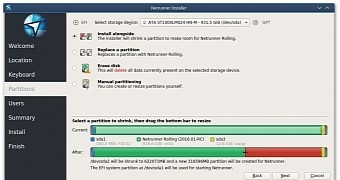Today, May 30, 2016, the development team behind Calamares, the next-generation, distribution-independent graphical installer framework, has announced the release of Calamares 2.2.3.
Calamares 2.2.3 is the third point release in the stable Calamares 2.2 series and arrives three weeks after the second maintenance build, Calamares 2.2.2, which added support for the latest Qt 5 GUI toolkit, addressed a build issue with very recent KPMcore builds, and improved the error reporting in the unpackfs module.
As expected, Calamares 2.2.3 fixes more issues that have been discovered or reported by users since Calamares 2.2.2, such as a bug that did not allow zram devices to be included in the devices list, as well as a problem that might have caused the bootloader location choice to be reset under certain circumstances.
locale.gen configuration and locale choice added for Debian distros
Besides the two bug fixes mentioned above, today's Calamares 2.2.3 maintenance release promises to improve the startup times of the universal installer, as well as to add support for configuring the locale.gen file and the ability to choose a locale on various Debian-based GNU/Linux operating systems.
Additionally, Calamares 2.2.3 updates the partitioning module to depend on the KPMcore 2.1 or later, but OS maintainers and users are being informed by the Calamares developers that KPMcore 2.1.1 build is recommended for providing NVMe device support on their distributions.
Calamares 2.2.3 is available for download right now as a source archive from its website, but you can also build the latest version from the Git master. However, please note that, if you choose to build Calamares from Git master, you'll need to initialize the libcrashreporter-qt submodule.
In the meantime, the Calamares development team is concentrating all of their efforts on implementing bleeding-edge features to the next major release of the universal installer framework, Calamares 2.3, which should arrive in the coming months with full disk encryption support based on LUKS.

 14 DAY TRIAL //
14 DAY TRIAL //